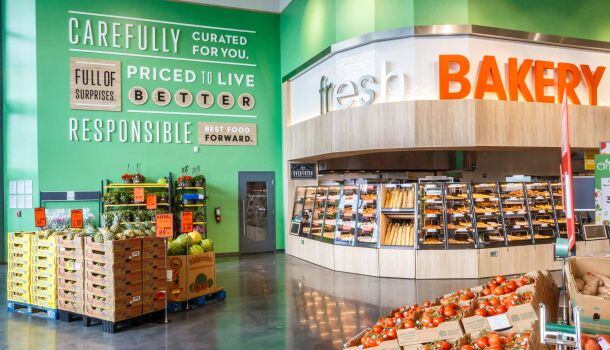According to a complaint* filed by Kroger on June 30, Lidl has engaged in “willful and deliberate acts of infringement and unfair competition," by developing a premium private label brand/logo (Preferred Selection) that closely matches Kroger's well-established 'Private Selection' line.
Lidl, in turn, says the lawsuit is merely a cynical bid to “drive up Lidl’s costs by having to defend against Kroger’s spurious claims.”
For a start, said Lidl in court documents filed July 14, the products don’t compete on the same shelves (Private Selection products are only sold in Kroger-owned stores, while Preferred Selection products are only sold in Lidl stores), and the court has to consider “how the marks are actually used in the marketplace” rather than comparing two logos devoid of context.
“Logically, consumers will only encounter the ‘Preferred Selection’ brand on products within Lidl stores, and not in any other store,” argued Lidl’s attorneys. “Consequently, when Lidl advertises the ‘Preferred Selection’ brand, it does so in connection with Lidl stores and the Lidl name.”
Meanwhile, Lidl’s Preferred Selection products are “almost exclusively imported products from Europe and other countries," whereas "Kroger’s ‘Private Selection’ products are generally domestic products,” added Lidl.
It also disputed Kroger’s argument that its Private Selection brand is strong and distinctive – and a ‘household name’ – and noted that both Safeway and Aldi use ‘Select’ or ‘Selected’ with stacked white text on a dark background in their private label ranges: “Private Selection is a weak, merely descriptive mark…”
What are the relevant factors in a trademark infringement case?
So what do attorneys specializing in IP think?
The factors courts use to decide trade mark infringement cases are often referred to as 'Polaroid factors' because they come from a case involving the Polaroid company (Polaroid Corp. v. Polarad Electronics, Corp., 287 F.2d 492 (2d Cir. 1961), and include:
(1) strength of the trademark;
(2) similarity of the marks;
(3) proximity of the products and their competitiveness with one another;
(4) evidence that the senior user may 'bridge the gap' by developing a product for sale in the market of the alleged infringer’s product;
(5) evidence of actual consumer confusion;
(6) evidence that the imitative mark was adopted in bad faith;
(7) respective quality of the products; and
(8) sophistication of consumers in the relevant market.
Channels of trade
When it comes to the proximity argument (#3), Lidl’s point that the products in question don’t compete on the same shelves is a persuasive one, Joel Rothman, a partner at Schneider Rothman Intellectual Property Law Group (which is not involved with this case), told FoodNavigator-USA.
“The channels of trade argument… is a good argument.”
However, he said, things may not be quite that clear cut: “Private label products are often featured in online ads and in circulars. If I am a customer considering shopping at Lidl instead of Kroger, I might check out the Lidl website, circular or ads to see if they offer the same private labeled products as Kroger, and seeing the similar ‘Preferred Selection’ might confuse me as being the same as my Private Selection’ brand purchased in the past…”
What’s the strength of the Private Selection trademark?
As for the strength and distinctiveness of Kroger’s Private Selection mark, he added: “The marks are also very descriptive and not very distinctive.”
That said, private label is gaining in importance and prominence these days he said: “In the past, generics and private labeled products were considered lower quality and commanded commensurate lower prices. The rise of all or majority private label outlets like Trader Joe’s changed all that. Many of the European markets operate (very profitably) in a similar fashion by limiting intrusion of outside brands and relying almost entirely on private labeled products.
“As a result, these days private labeled products are often considered as desirable or more-desirable for certain goods, especially those considered ‘gourmet’ like feta cheese, and these products being ‘store brands’ are higher profit for the stores that sell them.”
The timeline
So what happens next?
“If the injunction is granted, Kroger will declare victory and Lidl will probably agree to rebrand,” explained Rothman.
“If the injunction is denied, Lidl will declare victory and the parties will fight it out for a while longer while Kroger figures out what to do. Kroger could appeal but it’s a difficult standard and not likely to succeed."
'This case does not appear to be that compelling'
Given that the parties' products are not sold in the same stores, Kevin Bell, a principal of Porzio, Bromberg & Newman, said "I don't see this is a strong case against Lidl."
He added: "To prevail on a preliminary injunction in this case will require convincing the Court to agree that Kroger has a strong likelihood of succeeding on the merits [Kroger wants Lidl enjoined from using its 'Preferred Selection' mark on its products immediately, before the parties litigate Kroger's claims to conclusion].
"I find it hard to believe that a court would grant injunctive relief at this stage of the case. In the world of trademark cases involving allegations of 'confusingly similar' marks, this does not appear to be that compelling.
"There may be other business reasons Kroger is choosing to aggressively pursue Lidl shortly after its entry into the US, but I don't know that this was the best strategy."
*The case is THE KROGER CO., and THE KROGER CO. OF MICHIGAN v. LIDL US, LLC and LIDL STIFTUNG & CO. KG, 3:17-cv-00480 filed in the eastern district of Virginia.

